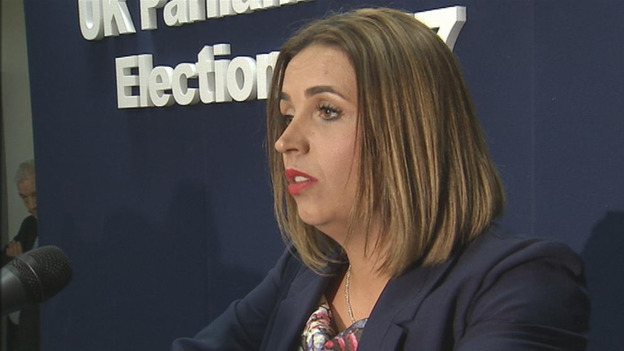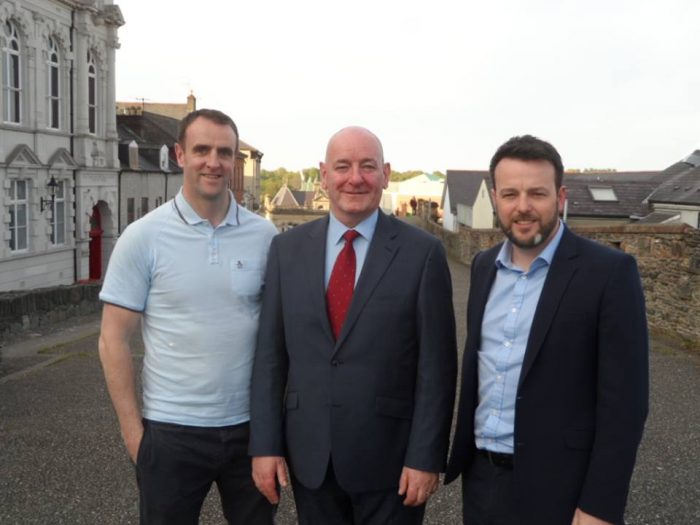
Elisha McCallion topped outgoing MP Mark Durkan by 169 votes
THE North’s former Chief Electoral Officer says voting fraud was rife here and only a very tight system will stamp out voter personation.
Derry born Pat Bradley was the Electoral Office boss between 1980 and 2000, a time when he says vote stealing was rampant.
Mr Bradley says that simple electoral systems, like the one used in the North, are easily overcome and need to be changed.
“In my experience, politics gives you access to power and people would do anything to get access to power,” he said.
“Politicians don’t want to have a complicated system here. They want it simple. But if it is very simple, it is easily overcome.
“I have worked around the world, I can give you systems that will work. The trouble is that the politicians will not accept this.
“If you have got a system that is susceptible to fraud, it will be happen. So there is a balance required – on the one hand having a secure system and on the other having a system that the public can use.”
The Foyle constituency was rocked last Thursday after Sinn Fein’s Elisha McCallion snatched the seat held by senior SDLP figures Mark Durkan and John Hume for the past 24 years, becoming the first Sinn Fein MP in the city for almost a century.
Mrs McCallion secured 18,256 votes to beat Mr Durkan’s tally by just 169 votes.
Earlier this week several Foyle voters contacted the Belfast Telegraph after they arrived at their polling stations to discover that their vote had been taken.
The SDLP’s Foyle MLA Mark H Durkan met on Tuesday with the current Chief Electoral Officer, Virginia McVea, to hand over what he said was evidence from Foyle of vote stealing. He said he is now aware of 20 cases of electoral fraud and wants the Electoral Office, the PSNI and the Secretary of State to act on the issue.
Mark H Durkan is set to meet the PSNI on Monday to discuss the allegations.
Mr Bradley said there was an onus on the SDLP to gather information and calculate if it made a difference to the outcome.
He said that voter personation has been an issue in Northern Ireland’s elections for as far back as he could remember.
“Personation has been a problem here from time immemorial,” he said. “When I was Chief Electoral Officer I tried to get the law changed. Unless you have a system where you have either eye recognition or fingerprinting to identify voters, there will be a problem. And that costs money.
“Personation happens. I remember one polling station being overseen by a very strict headmaster who was very well-known in that community.
“The first time that a certain party came into the system, they tried to impersonate people at his polling station.
“A young man came in to vote and said his name was John Brown. The headmaster, who knew everyone in the area, stood up and came over to the imposter and sniffed his coat.
“The young man asked him what he was doing and the headmaster said that he smelled very fresh for a man who had been dead for six months.”
Mr Bradley said that the system used by those intent on malice was a simple one.

Mr Durkan with his nephew Mark H Durkan and SDLP leader Colum Eastwood following his selction to run in Foyle again. Now SDLP crying foul saying some electorate weren’t able to cast their vote because of impersonation
“There is a technique used by parties,” he added. “They have a record of the people who haven’t voted in the last election. That information can be used for genuine or malicious reasons.
“The genuine reason is that they want to contact those people and encourage them to vote. The malicious reason is that they use it as ammunition for personation at the next election.”
Mr Bradley said there are ways to try and overcome the problem.
“When you come across what I call a hotbed, when you are suspicious of a number of things, it’s like detective work,” he added.
“There’s knowledge, there’s evidence and above all there’s determination. I used to sit for five or six hours going through the records in one ward alone.
“If I was the SDLP I’d be appealing for those people it has happened to, to contact them so they can gather the information and calculate if this made a difference to the election. The onus is on the SDLP now.”
Mr Bradley said that it was the job of police to uncover any wrong doing, but that he didn’t hold much hope for convictions.
“Firstly the police know that they have to do something,” he said. “Otherwise from the unionist perspective they are supporting Sinn Fein by not doing anything. Secondly, if there are allegations of illegal practice they have a statutory obligation to investigate.
“But I will be pleasantly surprised if they come to court, because in the past they have not been able to prosecute.”
Tags:




